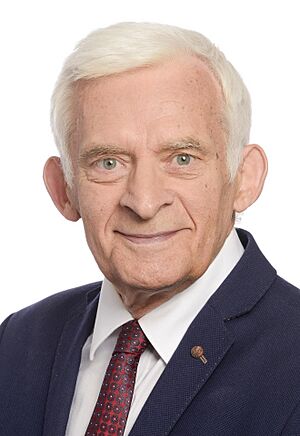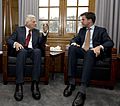Jerzy Buzek facts for kids
Quick facts for kids
His Excellency
Jerzy Buzek
|
|||||||||||||
|---|---|---|---|---|---|---|---|---|---|---|---|---|---|

Official portrait, 2019
|
|||||||||||||
| President of the European Parliament | |||||||||||||
| In office 14 July 2009 – 17 January 2012 |
|||||||||||||
| Deputy |
See list
Giovanni Pittella
Rodi Kratsa-Tsagaropoulou Stavros Lambrinidis Miguel Angel Martínez Martínez Alejo Vidal-Quadras Dagmar Roth-Behrendt Libor Rouček Isabelle Durant Roberta Angelilli Diana Wallis Pál Schmitt Edward McMillan-Scott Rainer Wieland Silvana Koch-Mehrin |
||||||||||||
| Preceded by | Hans-Gert Pöttering | ||||||||||||
| Succeeded by | Martin Schulz | ||||||||||||
| Prime Minister of Poland | |||||||||||||
| In office 31 October 1997 – 19 October 2001 |
|||||||||||||
| President | Aleksander Kwaśniewski | ||||||||||||
| Deputy |
See list
Longin Komołowski
Leszek Balcerowicz Janusz Tomaszewski Janusz Steinhoff |
||||||||||||
| Preceded by | Włodzimierz Cimoszewicz | ||||||||||||
| Succeeded by | Leszek Miller | ||||||||||||
|
|||||||||||||
| Personal details | |||||||||||||
| Born |
Jerzy Karol Buzek
3 July 1940 Smilowitz, Nazi Germany (now Czech Republic) |
||||||||||||
| Political party | Civic Platform | ||||||||||||
| Other political affiliations |
European People's Party | ||||||||||||
| Spouse | Ludgarda Buzek | ||||||||||||
| Children | Agata | ||||||||||||
| Education | Silesian University of Technology | ||||||||||||
| Awards | |||||||||||||
| Signature |  |
||||||||||||
Jerzy Karol Buzek, born on July 3, 1940, is a well-known Polish politician. He was the Prime Minister of Poland from 1997 to 2001. Later, he became a Member of the European Parliament in 2004. From 2009 to 2012, he served as the President of the European Parliament. He is married to Ludgarda Buzek and is the father of Polish actress Agata Buzek.
Contents
Early Life and Family
Jerzy Karol Buzek was born on July 3, 1940, in Smilovice, which was then part of Nazi Germany. Today, this area is in the Czech Republic. His family, the Buzeks, was important in Polish politics before World War II. They were part of the Polish community in the Trans-Olza region. Jerzy's father was an engineer. After the war, his family moved to Chorzów, Poland. Jerzy Buzek is a Lutheran.
Education and Career
In 1963, Jerzy Buzek finished his studies at the Silesian University of Technology. He specialized in chemical engineering. He then became a scientist at the Chemical Engineering Institute of the Polish Academy of Sciences. Since 1997, he has been a professor of technical science. He also has honorary doctorates from universities in Seoul and Dortmund.
Prime Minister of Poland
From 1997 to 2001, Buzek was the Prime Minister of Poland. In 1998, he received the Grzegorz Palka Award. He was also named European of the Year by the European Union Business Chambers Forum. The Polish political weekly Wprost named him 'Person of the Year' in 1998 and again in 2009. When he won the award a second time, he was the President of the European Parliament. He noted that he was the first winner honored for his work outside Poland.
Jerzy Buzek was the first Prime Minister of the 3rd Republic of Poland to serve a full term. He was also the first Lutheran Prime Minister in Poland's history. After losing the elections in 2001, he stepped away from politics. He focused on his scientific work. He became a prorector at Akademia Polonijna in Częstochowa. He also became a professor at the Opole University of Technology in Opole.
Return to Politics
In 2004, Jerzy Buzek returned to politics. He was elected to the European Parliament from Katowice. He received the most votes in Poland. His party is the Civic Platform, which is part of the European People's Party. On March 30, 2011, while he was President of the European Parliament, he received an honorary fellowship. This was from the Institution of Chemical Engineers in Brussels, Belgium.
Political Journey
In the 1980s, Buzek was active in anti-communist movements. This included the Solidarity trade union in communist Poland. He helped organize the union's underground groups. He also chaired several national meetings when Solidarity was allowed to be part of politics again.
Jerzy Buzek was a member of the Solidarity Electoral Action (AWS). He helped create the AWS's economic plan. After the 1997 elections, he was elected to the Sejm, which is the lower house of the Polish Parliament. Soon after, he became the Prime Minister of Poland. In 1999, he became the chairman of the AWS Social Movement. In 2001, he became the Chairman of the Solidarity Electoral Action group.
Buzek's Government in Poland
From 1997 to 2001, Jerzy Buzek led the Polish government. First, it was a coalition government with AWS and the Freedom Union. Later, it became a right-wing AWS minority government. His government made four big changes:
- A new way of dividing Poland into local governments.
- A reform of the pension system.
- A reform of the education system.
- A reform of the medical care system.
The AWS party lost the 2001 Polish parliamentary election. Buzek then resigned as chairman of the AWS Social Movement.
Member of the European Parliament
On June 13, 2004, Jerzy Buzek was elected as a Member of the European Parliament (MEP). He ran from the Silesian Voivodeship. He received a record 173,389 votes, showing his popularity. His party is the Civic Platform.
In the European Parliament from 2004 to 2009, he was part of the Committee on Industry, Research and Energy. He also worked on relations with Ukraine and Central American countries. He helped create the EU's 7th Framework Programme for Research and Development. This was a large spending plan for research.
On June 7, 2009, Buzek was re-elected as an MEP. He again received a record number of votes in Poland: 393,117. On September 12, 2018, he voted to approve the Directive on Copyright in the Digital Single Market. From 2014 to 2019, he chaired the Committee on Industry, Research and Energy. This committee handles industrial policy, research, space, and energy.
President of the European Parliament

On July 14, 2009, Buzek was elected President of the European Parliament. He received 555 out of 644 votes, which was the largest majority ever. He became the first person from a former Eastern Bloc country to hold this position. He took over from Hans-Gert Pöttering. He promised to focus on human rights and the Eastern Partnership during his two-and-a-half-year term.
In his first speech, Buzek said the European Parliament faced big challenges. These included the economic crisis, European unity, human rights, and reforms within the Parliament. He also said he would work on reforming the European economy, reducing unemployment, and dealing with climate change. He believed the Lisbon Treaty was key to making the European Union strong and effective.
On December 8, 2009, Buzek received the "Staatspreis award" from North Rhine-Westphalia. This award honored his achievements and highlighted the European Parliament's role in uniting Europe. Buzek donated the prize money to the European Humanities University (EHU). This is a Belarusian university in exile in Vilnius.
The Lisbon Treaty became law on December 1, 2009, shortly after Buzek became president. This treaty greatly increased the European Parliament's powers. Parliament gained equal rights with the Council of Ministers in many areas. These areas include agriculture, energy, immigration, justice, and health.
In late 2011, Buzek's presidency supported the 'Sixpack' laws. These laws aimed to fix the growing Eurozone crisis. Buzek said that these laws would make sure member countries' budgets were reliable.
One of Buzek's challenges as president was dealing with claims of corruption. Some members of the European Parliament were accused of illegal lobbying. On July 7, 2011, a new code of conduct for MEPs was approved. It was officially adopted on December 1, 2011. This code sets rules for MEPs to avoid conflicts of interest. Buzek said that more power for the Parliament means more transparency for its members. The code requires MEPs to declare their paid activities outside Parliament. It also bans MEPs from taking money to influence decisions.
Images for kids
-
Jerzy Buzek with President of the European Commission José Manuel Barroso and Polish President Bronisław Komorowski
-
Jerzy Buzek and Jose Manuel Barroso during an EPP Summit in 2009
-
European Big Three; Jerzy Buzek, Herman Van Rompuy, José Manuel Barroso
-
Jerzy Buzek with Russian President Dmitry Medvedev
-
Jerzy Buzek with President of Georgia Mikheil Saakashvili
-
Jerzy Buzek with Nicos Anastasiades
-
Jerzy Buzek with Jyrki Katainen
-
Jerzy Buzek with Mariano Rajoy
-
Jerzy Buzek with Prime Minister of the Netherlands Mark Rutte
Career Highlights
Education and Research
- From 1997 to 2001: Professor of technical sciences and Prime Minister of Poland.
- Received honorary doctorates from universities in Dortmund, Seoul, and Süleyman Demirel University.
- Was a university lecturer for many years in Opole, Gliwice, and Częstochowa.
- Worked as a researcher at the Institute of the Polish Academy of Sciences in Gliwice.
- In 1972: Studied at the University of Cambridge with a British Council scholarship.
Professional and Political Roles
- 1992–1997: Represented Poland at the International Energy Agency.
- 1996: Organized and chaired a group of 19 institutions working on energy and environmental protection.
- Wrote about 200 research papers and held three patents in environmental protection and engineering.
- 1981: Member of the 'NSZZ Solidarność' trade union.
- 1981: Active in the underground Solidarność movement.
- 1997: Elected as a Member of the Polish Parliament.
- As Prime Minister in 1999, he helped Poland join NATO. He also prepared the country to join the European Union.
- 1998: Started talks for Poland to join the European Union.
- 1999: Represented the Social Movement of Solidarity Electoral Action in the PPE–DE.
- 1999: Created the annual Pro Publico Bono prize for the best national community projects.
- Started the Family Foundation with his wife in 1998.
- 2012: Became a member of the International Honorary Council of the European Academy of Diplomacy.
Personal Life
Jerzy Buzek supports the Ruch Chorzów football club.
Awards and Honors
 Knight Grand Cross of the Order of Isabella the Catholic (Spain, May 11, 2001).
Knight Grand Cross of the Order of Isabella the Catholic (Spain, May 11, 2001).- In 2010, he received the Collier award from the Fondation du Mérite européen. This was for his role as President of the European Parliament.
 European Union: In 2020, he received the Outstanding Achievement Award at The Parliament Magazine's MEP Awards.
European Union: In 2020, he received the Outstanding Achievement Award at The Parliament Magazine's MEP Awards.
See also
 In Spanish: Jerzy Buzek para niños
In Spanish: Jerzy Buzek para niños











